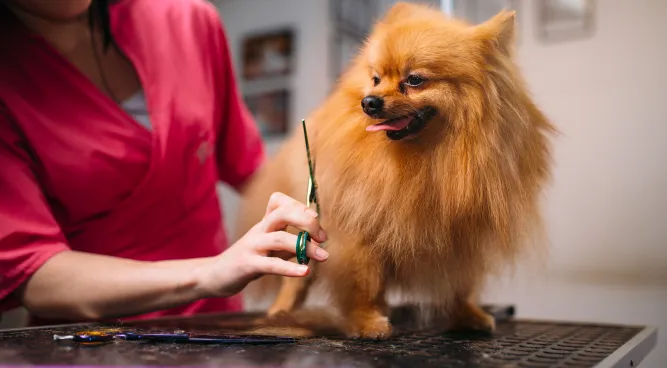Merle French Bulldog – Everything You Need To Know

Table of Contents
Introduction
Get all the information you need about Merle French Bulldogs in this comprehensive guide. From their unique coat color to their temperament and health considerations, we cover it all. Find expert insights and FAQs to deepen your understanding of these charming dogs. Welcome to our comprehensive guide on Merle French Bulldogs. If you’re a dog lover, you’ve probably come across these adorable and unique-looking canines at some point. Merle French Bulldogs are a captivating breed known for their striking coat patterns and charming personalities. In this article, we will delve deep into the world of Merle French Bulldogs, providing you with valuable information about their history, characteristics, care, and more. Whether you’re a seasoned dog owner or considering bringing home your first Merle Frenchie, you’ll find everything you need to know right here.
Merle French Bulldogs – A Unique Coat Color
Merle French Bulldogs boast a mesmerizing coat color pattern that sets them apart from other French Bulldog varieties. This coat pattern features irregular splotches of darker colors on a lighter background. The distinctiveness of their coats makes them highly sought after among dog enthusiasts. The Merle gene responsible for this pattern can also be found in other breeds, but in French Bulldogs, it creates a particularly captivating appearance.
Understanding the Merle Gene
The Merle gene is a fascinating genetic trait that plays a crucial role in creating the beautiful coat patterns seen in Merle French Bulldogs. It is a dominant gene that can be inherited from either parent. When a dog inherits one copy of the Merle gene (Mm) and one non-Merle gene (Nn), it exhibits the Merle coat pattern. However, when two copies of the Merle gene (MM) are inherited, it can lead to health issues, such as deafness and eye abnormalities, which is why responsible breeding practices are essential.
A Rainbow of Colors
One of the most intriguing aspects of Merle French Bulldogs is the wide range of colors they can exhibit. From blue and lilac to chocolate and fawn, their coats come in an array of captivating hues. Each Merle Frenchie is unique, with its specific combination of colors, making them truly one-of-a-kind companions.

The Debate Around Merle Frenchies
While many dog enthusiasts adore the unique appearance of Merle French Bulldogs, there has been some controversy surrounding the breeding of these dogs. Some argue that responsible breeding practices are essential to ensure the health and well-being of the pups, while others believe that Merle Frenchies should not be bred due to potential health risks. It’s crucial for prospective owners to do their research and choose reputable breeders who prioritize the health and welfare of their dogs.
Characteristics and Temperament
Merle French Bulldogs possess a charming and lovable personality that endears them to families worldwide. Here are some key characteristics and temperament traits that make them such delightful companions:
Playful and Affectionate
Merle French Bulldogs are known for their playful and affectionate nature. They thrive on human interaction and enjoy spending satisfactory time with their owners. Whether it’s playing fetch in the backyard or cuddling on the couch, these dogs are always up for some fun.
Intelligent and Trainable
As descendants of the popular French Bulldog breed, Merles inherit their intelligence and adaptability. With consistent and positive reinforcement training, they can quickly learn commands and tricks. Training sessions should be kept short and engaging to keep them interested and focused.
Sociable and Friendly
Merle French Bulldogs are inherently social animals. They get along well with other dogs and pets, making them an excellent choice for multi-pet households. Additionally, their friendly nature makes them great companions for children, provided the interactions are supervised to ensure everyone’s safety.
Moderate Energy Levels
While Merle French Bulldogs enjoy playtime and short walks, they are not overly active dogs. Their moderate energy levels make them suitable for apartment living, as long as they receive regular exercise and mental stimulation.
Companionship Needs
Merle French Bulldogs are loyal and devoted to their families. They thrive on companionship and can suffer from separation stress if left alone for long periods. If you have a busy lifestyle, consider having a dog sitter or a daycare service to keep them company while you’re away.

Health Considerations
As with any dog breed, Merle French Bulldogs have specific health considerations that prospective owners should be aware of. Responsible breeders take these factors into account to produce healthy and happy puppies.
Deafness and Vision Issues
As mentioned earlier, double Merle (MM) French Bulldogs have an increased risk of deafness and vision issues. These dogs should not be bred together, as it can lead to serious health problems for the offspring. Responsible breeders carefully pair Merle Frenchies with non-Merle dogs to minimize these risks.
Respiratory Concerns
Like their French Bulldog relatives, Merle Frenchies have brachycephalic features, including a short muzzle and flat face. This conformation can lead to respiratory challenges, especially in hot weather. It’s essential to provide them with a cool and comfortable environment and avoid strenuous activities during peak temperatures.
Hip Dysplasia
Hip dysplasia is a common orthopedic issue that affects many dog breeds, including French Bulldogs. Regular vet check-ups and a healthy diet can help monitor and manage this condition.
Allergies
Some Merle French Bulldogs may be prone to skin allergies. Proper grooming, a balanced diet, and regular vet visits can help address and manage any allergy-related concerns.
Weight Management
Maintaining a healthy weight is vital for the overall well-being of Merle French Bulldogs. Obesity can exacerbate existing health issues and lead to additional health complications. Be sure to feed them a nutritious diet and engage in regular exercise. Great post to read about yak cheese for dogs.
Caring for Your Merle French Bulldog
Owning a Merle French Bulldog comes with the responsibility of providing them with the best care possible. Here are some essential tips to ensure your furry friend leads a happy and healthy life:
Balanced Diet
A well-balanced and nutritious diet is crucial for the optimal health of your Merle Frenchie. Consult with your veterinarian to determine the appropriate diet for your dog based on age, weight, and health condition.
Regular Exercise
While Merle French Bulldogs are not highly active, they still require regular exercise to stay healthy and mentally stimulated. Short walks and playtime in a secure yard are ideal ways to keep them active.
Grooming Needs
Merle French Bulldogs have a short, smooth coat that requires minimal grooming. Regular brushing and occasional baths will help keep their coat clean and healthy.

Regular Vet Check-ups
Routine visits to the veterinarian are essential to monitor your dog’s health and address any potential issues promptly. Vaccinations, dental care, and parasite prevention should be part of the regular check-up routine.
Training and Socialization
Early training and socialization are vital for Merle French Bulldogs to develop into well-mannered and well-adjusted adults. Enroll them in puppy classes and expose them to various environments, people, and animals.
FAQs
What Is A Merle French Bulldog Worth?
The price of a Merle French Bulldog can vary significantly depending on factors like the dog’s pedigree, coloration, and breeder reputation. On average, Merle French Bulldogs can cost anywhere from $3,000 to $10,000 or more.
What Is A Merle French Bulldog?
A Merle French Bulldog is a unique variation of the French Bulldog breed known for its striking coat color pattern. The merle gene creates irregular patches of darker colors on a lighter background, resulting in captivating and eye-catching patterns.
Are Merle French Bulldogs Rare?
Yes, merle French Bulldogs are taken into consideration rare due to the particular genetic mixture required to supply the merle coat sample. The gene can also carry potential health risks, leading to responsible breeding practices and limited availability.
Why Are Merle French Bulldogs So Expensive?
The rarity of merle French Bulldogs, coupled with the demand for their distinctive appearance, contributes to their high price. Additionally, responsible breeding practices and health screening tests raise the cost of producing healthy merle Frenchies, further contributing to their expensive price tag.
Final Thought
In conclusion, Merle French Bulldogs are charming and unique companions that bring joy and love into the lives of their owners. With their captivating coat patterns and affectionate personalities, they have rightfully earned their popularity among dog enthusiasts worldwide. However, it’s crucial to understand the responsibility that comes with owning a Merle Frenchie, especially in terms of health considerations. By providing them with proper care, love, and attention, you can enjoy a long and rewarding companionship with your Merle French Bulldog.
Table: Food Type that Suitable for Merle French Bulldogs
| Food Type | Suitable for Merle French Bulldogs? |
| High-quality Dog Food | Yes, choose a balanced and nutritious formula. |
| Cooked Meat | Yes, lean meats like chicken, turkey, and beef. |
| Fish | Yes, cooked fish like salmon or tuna. |
| Vegetables | Yes, safe options include carrots, peas, and broccoli. |
| Fruits | Yes, in moderation, choose fruits like apples and blueberries. |
| Rice and Pasta | Yes, cooked plain rice or pasta can be given occasionally. |
| Eggs | Yes, cooked eggs are a good protein source. |
| Dairy Products | Some dogs may tolerate small amounts of plain yogurt or cheese. |
| Peanut Butter | Yes, in moderation, choose natural peanut butter without xylitol. |
| Cottage Cheese | Yes, as an occasional treat. |
| Sweet Potatoes | Yes, cooked sweet potatoes are a good source of nutrients. |
| Pumpkin | Yes, plain canned pumpkin can help with digestion. |
| Oatmeal | Yes, cooked plain oatmeal can be given occasionally. |
| Bread | Yes, in small quantities, opt for whole-grain options. |
| Blueberries | Yes, as a healthy and tasty treat. |
| Apples | Yes, remove seeds and core before giving. |
| Watermelon | Yes, remove seeds and rind before giving. |






